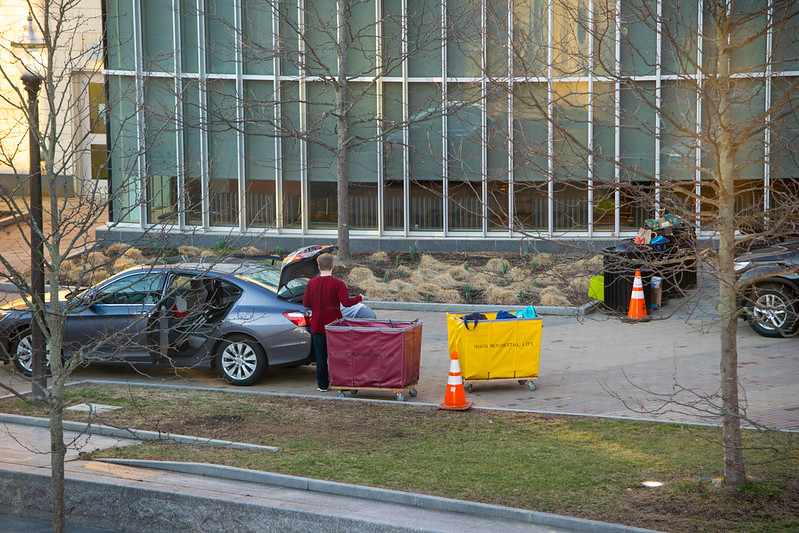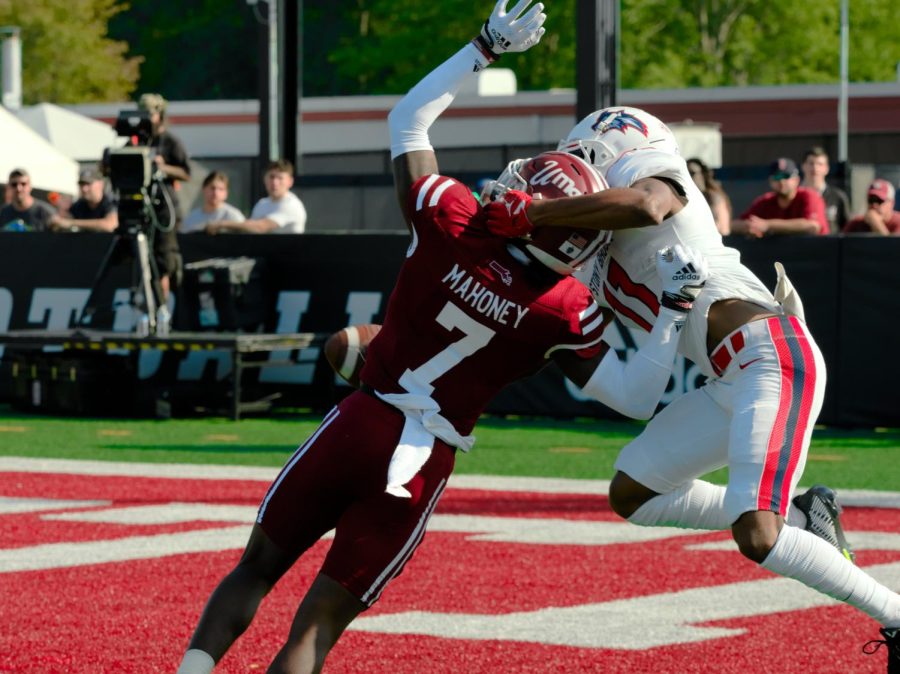Following an August 6 announcement to significantly reduce the scale of the University of Massachusetts’ original Fall 2020 reopening plan, Chancellor Kumble Subbaswamy and other UMass panelists responded to questions and concerns posed to them regarding the 1,069 students who will officially be allowed to live on campus this fall.
The large drop in numbers was announced by Residential Life Student Services Director Dawn Bond, who added that room selection had been completed at noon on the day of the virtual forum and that only 224 members of the on-campus population will be first-year students.
According to Director of Residence Education Jean MacKimmie, UMass normally accommodates around 14,000 students in campus residence halls. While Subbaswamy indicated that under UMass’ original plan, about 6,000 students would have lived in residence halls and about 8-9,000 students would have been on-campus in one way or another under the previous proposal.
“Campus will be, for those of you who are returning to us, a lot quieter than what you’re accustomed to, with a much smaller population,” said MacKimmie.
Now just one-fourteenth of the average student population will reside on-campus exemplifying the vast efforts to bring back less people enacted by the University in response to growing concerns, especially by local residents, related to the COVID-19 pandemic and a large influx of students to the area, which has the potential to overwhelm local hospital and ICU beds should a sizable outbreak occur.
The original plan would have welcomed back on-campus students regardless of need or essential campus access. Students who still qualify for on-campus housing will be those with essential face-to-face classes such as laboratory, studio and capstone courses and those who require special accommodations on case-by-case bases, such as those dependent on campus housing and dining, some international students with specific visa requirements and students in healthcare fields.
Deputy Chancellor and Chief Planning Officer Steve Goodwin said that for those with in-person classes many aspects will be quite different than usual. In addition to fewer face-to-face courses in general, densities have been lowered within courses, signage will be posted such as one-way entrances and exits, some seating will be specifically marked and the use of face coverings will be required.
Goodwin added for laboratory and studio classes that require students to interact closer than six feet apart, that these students will have to wear face shields, provided courtesy of the University.
Classes have also been moved when possible to rooms where the air circulation rates have been increased to MERV 13 or 14, indicating excellent air quality according to Goodwin, and weather permitting, classes may be held outdoors around campus in large tents specifically acquired for outdoor instruction.
As for advising, even if a course has an in-person format all advising and office hours will be conducted virtually, Goodwin said. Executive Director for Engagement Johnny Tooson said that all campus activities and events will be virtual too, including meet and greets for on-campus students. Tooson added that a “virtual club fair” will occur for the approximately 350 registered student organizations to engage with and recruit new members as well.
MacKimmie noted that while individuals from outside one’s residence hall will not be permitted within under UMass’ no guest policy, once students have arrived on campus and testing protocol is in place “we will start to provide opportunities for students to connect in small groups, in-person.” This will mostly be contained to students within the same residence hall who will essentially act as their own bubble.
Face coverings will be required of students outside of their own rooms such as when visiting other students in their building or in the hallways. Masks will not have to be worn in the company of roommates so long as students are within their own shared housing assignment. Occupancy limits will be set for other common spaces in residence halls though according to MacKimmie, but additional outdoor seating has been added around residence halls as well to provide more spaces for students to gather safely.
Housing has been limited to suite and apartment style dormitories to reduce the number of students sharing a common space and a bathroom to a maximum of three others, meaning that the few residential areas that could accommodate such a setup would be the Commonwealth Honors College, the Sylvan Residential Area and the North Apartments.
On move-in day up to two helpers can assist their student with move-in and will be allowed to enter the student’s residence hall, permitted they wear a face mask, during a two-hour period selected within Spire. However, before move-in begins students will need to go directly to testing upon arrival according to Bond and should arrive 30 minutes prior to their designated time.
Bond said the asymptomatic coronavirus testing occurring at the Mullins Center takes “about five minutes” to complete and once students are done with the test they will have the remainder of the two hours to unpack and get settled with those they came with.
Families can grab a meal from either Franklin Dining Commons or the Campus Center which will mostly be to-go, but seating will be available for parties of up to six individuals according to Garett Distefano, director of dining services.
Franklin will be the only dining commons open at the beginning portion of the semester Distefano said, but there will be a transition over to the newly built Worcester Dining Commons which is slated to open on October 5.
Franklin’s hours will run from 7 a.m. through 12 a.m. to include late-night dining options for students and most Campus Center retail and eatery locations will be open from 8 a.m. to 9 p.m. as well. The UMass food trucks will also serve students in the fall, but the popular Roots Café will be closed.
On-campus students will have primary access to meal plans with certain exceptions specifically for those with high needs or food security concerns and those students are recommended to apply for an exception on the UMass Dining website and will receive an answer within 24 hours, Distefano added.
“Most of the food will be served to-go. We will have some inside dining, but that’s going to be limited based upon the phase we are currently in and the rules of opening in the state of Massachusetts,” Distefano said.
For students coming to campus from high risk states designated by the Massachusetts state government to include all but Connecticut, Maine, New Hampshire, New Jersey and New York as of the publishing of this article (Rhode Island despite being a New England state is considered high risk at this time), will have to quarantine upon arrival.
These students will be housed for a two-week quarantine period within the Campus Center hotel, according to Executive Director of Environmental Health and Safety and Emergency Management Jeffrey Hescock.
“The hotel has single occupancy with their own bathrooms in those rooms,” Hescock said. “We have a dedicated team that are working with all these students to provide logistics and support when they arrive and as they’re here and then we’re having four meals a day provided by dining services.”
Hescock added that these meals will be delivered to students “like they’re having room service.”
Hescock also detailed the implementation of UMass’ semiweekly asymptomatic testing program in which on-campus students were told they would receive an email explaining how to schedule their testing for move-in day and how to further schedule frequent testing throughout the semester, primarily through the UMass Health Hub application.
Students will get tested on either a Monday/Thursday or a Tuesday/Friday basis and they will receive their final COVID-19 test results before returning home at the end of the semester, Hescock added.
In the FAQ page for UMass coronavirus testing it notes that while twice per week surveillance testing will have its costs covered by the University, symptomatic testing and testing for individuals in close contact with a positive test case are “covered by insurance.”
The Mullins Center will open for testing on Monday, August 17 and will be open from 9 a.m. to 5 p.m., seven days a week. If a student tests positive either through symptomatic or asymptomatic testing they will receive a call and will go into isolation according to Ann Becker, a lecturer in the College of Nursing.
Becker noted that a dashboard will also be posted on UMass’ COVID response website to keep track of general numbers concerning testing, but that names and identities of positive cases will remain anonymous for the sake of privacy.
Goodwin noted that UMass is “diversifying testing” in order to keep up its supply chain needed throughout the semester.
“We’re actually planning to do about 12,000 tests a week, so it’s quite a big endeavor and we think we’re up to the challenge,” Goodwin said.
Testing was a key component in Subbaswamy’s decision to reverse UMass’ Fall 2020 plans. “When we made our original plan back in the end of June – early July – we based our decision on what was then known and what we thought we could do to best contain the spread of the virus,” according to the chancellor.
“We’ve always said that our decision will be based on the best science and the best data available at the time,” Subbaswamy said.
“Every indication was that the pandemic was coming under control in the country and certainly in Massachusetts and around the country,” he said. “As the month of July progressed and as we went into the implementation phase, namely bringing all the logistics of lining up the testing capacity, figuring out what reconfiguration we needed to make to residence halls, to dining commons and to classrooms, all of those aspects, as we got more and more exposed to that, the situation in the country also began to change.”
“Certainly, there were outbreaks throughout the country and also even in parts of Massachusetts, it really began to go up, rather than down, and in fact even as close as Holyoke and Granby were listed as the highest risk in terms of increasing coronavirus spreading,” Subbaswamy added.
Subbaswamy said that as UMass took these considerations into account so as not to have to upend classes a mere two to four weeks into the semester and have to send everyone home once again as the University had to do in the spring.
“[The risk] was high enough that we thought the most prudent thing to do…was to in fact de-densify as far as possible and only keep the bare minimum of students who need to have face-to-face classes,” he said.
Subbaswamy emphasized that once this decision was made, it was quickly relayed to students within six to eight hours.
He stated that many details about the coronavirus were not abundantly clear in the beginning saying, “Back then it seemed like young people really weren’t getting the disease, but also that whether they were carrying [or] spreading the disease or not was unclear, but now it’s very clear that young people, even as young as five- and seven-year-olds…even if they’re asymptomatic they may be carrying and spreading the virus.”
In addressing the concerns of those worried about students violating the UMass student agreement Vice Chancellor for Student Affairs and Campus Life Brandi Hephner LaBanc said, “Our primary approach to all this is really going to be educational, we know students will make mistakes.”
“Some of those will be completely unintentional and we understand that, some of those will reflect poor decision making,” Hephner LaBanc said. “But there may be some that’s just an unwillingness to comply and, in those situations, we will escalate those things to have an administrative conversation and check in with the student to figure out what’s going on.”
Hephner LaBanc said the University will continue to remind students to be good community members, promote mask wearing and social distancing and ask students to take on active bystandership among other strategies for compliance and direct students to campus resources too.
Associate Dean for Off-Campus Student Life Sally Linowski addressed these concerns for off-campus students living in apartments and rental homes in and around Amherst who are conducting remote learning, saying this group is still expected to abide by the UMass student agreement.
Linowski added that violations by these students will be addressed with personal intervention by appropriate staff and will often be in the form of reminders, best practices and direct emails. Linowski emphasized that an educational approach to COVID safety is a “primary focus” and updates will be sent to off-campus students concerning local, state and health developments of the disease.
However, Linowski noted that off-campus students are “still a part of the community,” adding “They are very much welcome here, and that we’re here for them for whatever needs they may have.”
Linowski added that fraternity and sorority houses have been made aware of the University’s expectations and that all recruitment and events for Greek life will be virtual. She added that in-person events will not be hosted at these facilities and that “we will be monitoring that closely.”
Dean of the Commonwealth Honors College Mari Castañeda was hopeful about the quality of the online courses for Fall 2020 saying that she is “very confident” they will look different than those in the spring semester which were abruptly switched to online.
“I know that spring [semester] was a challenge for lots of people and I myself was also teaching in the spring,” Castañeda said. “But I also know this summer the faculty have been working really intensely to make sure that their courses are very robust and meaningful for the fall semester.”
She added that faculty have started reaching out to students and she encouraged students to reach out to their professors saying, “Faculty are just as eager to hear from you, just as you are eager to hear from them.”
Vice Provost for Enrollment Management Jim Roche said financial aid adjustments are being made final and should be finished by the end of next week. These will primarily concern students who were supposed to, but no longer will, live on campus or have access to a meal plan and those will appear on Spire. He added that the payment deadline for the Bursar’s Office has been moved from August 21 to September 7.
Vice Chancellor for Administration and Finance Andrew Mangels also addressed the three primary fees billed to students separately from tuition including the IT fee, the student activities fee and, dependent upon enrollment, a laboratory fee.
“Those fees are developed and designed to support the services and functions of those activities,” Mangels said. “A tremendous amount of work has been put into converting a lot of the activities to remote events and ensuring that students can access all of the services in a safe and healthy manner. So, to that extent there will be no reduction in fees.”
“Those fees also go to support a lot of the maintenance and a lot to sometimes the debt service, particularly as far as the Student Union renovation building goes, so there’s a lot of ongoing costs that occur regardless of whether students are accessing those services physically or on campus or remotely.”
Mangels also addressed changes to the PVTA bus schedules.
“PVTA buses will be running pretty similar to last year with some modifications on some of the bus route,” Mangels said. “All the PVTA bus routes will end at midnight Monday through Saturday and at 10:30 p.m. on Sundays.”
“For everyone’s safety, everybody’s concerned about riding on the buses, all drivers will wear face masks and all passengers are going to be required to wear a face mask as well. We ask people not to ride if they’re symptomatic or quarantined or exposed to anybody who’s tested positive.”
He added that all PVTA bus schedules will become available starting next week on the UMass transit website, where riders can get the most up-to-date information.
The first virtual campus forum held the day before focused primarily on the questions and concerns for students taking classes entirely remotely, who will not access to campus. Both events were moderated by Office of the Chancellor Chief of Staff Rolanda Burney.
There were about 500 participants registered for this second forum according to Subbaswamy and it lasted for about an hour and 15 minutes in length.
Subbaswamy thanked participants for their patience as the University has worked through the “unprecedented challenges of the COVID-19 pandemic.”
“I know that the past six months have been trying for you as you navigated your plans for the 2021 academic year and understandably your concerns about your university experience this fall,” Subbaswamy said. “I want you to know that we know, we hear about your concerns and that’s why we’re here today.”
Chris McLaughlin can be reached at [email protected] and followed on Twitter @ChrisMcLJournal.




















